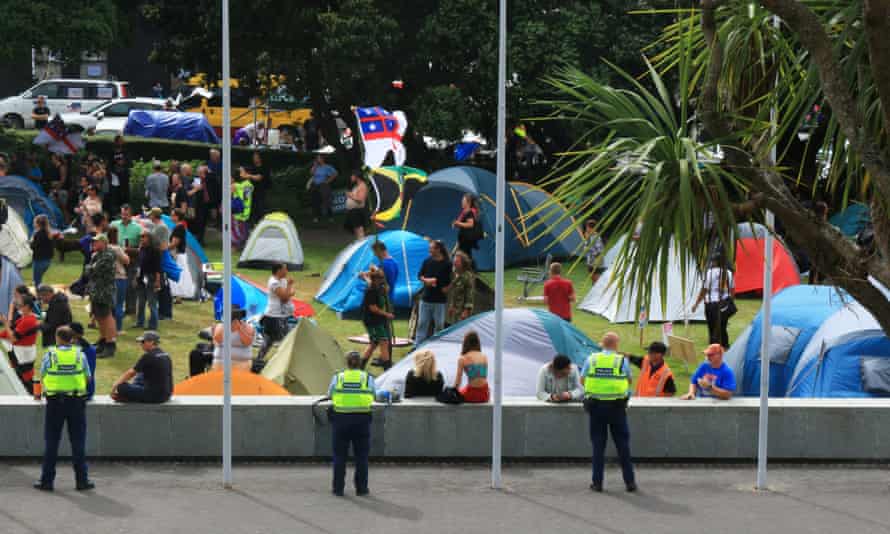New Zealand’s anti-vaccine protesters are being evicted from parliament grounds on the third day of their protest, with more than 50 arrested after clashes with police.
Police brought in around 100 extra officers from around the country on Thursday to try to clear the protesters from parliament grounds, where they had pitched tents and parked cars, blocking traffic.
The protesters, inspired by the “siege of Ottawa” where truckers paralysed the city and caused a state of emergency, led a convoy of several hundred vehicles to parliament on Tuesday. A number stayed overnight, pitching tents on the lawns.
Tensions boiled over, as the wall of more than 100 police officers advanced their line a few metres every half hour, ripping out tents as they went.
The police were picking people off one-by-one at the front of the line, prompting scuffles to break out, and sparking shouts from the crowd of “shame on you, shame on you!” towards the officers.
A drum beat persistently and occasionally the group of a few hundred protesters erupted into songs in Māori and English, including New Zealand’s national anthem. A man egged on the crowd through a loudspeaker: “thank you for standing up for New Zealand!” he shouted.
Away from the frontline, the atmosphere was less volatile, with protesters sitting in deck-chairs, or filming on their phones.
Wellington police district commander Supt Corrie Parnell said on Thursday morning that “police have appealed repeatedly to protesters to leave the grounds and have begun evicting people from the precinct”.
“While police acknowledges people’s right to protest, this needs to be conducted in a way that does not unfairly impact on the wider public.” By early afternoon, 50 had been arrested for refusing to leave parliament after being issued a trespass order.
Most New Zealanders have supported the vaccine: 94% of those aged 12 and over are vaccinated with two doses.
New Zealand has vaccine mandates that cover many workers in jobs designated “high contact” – including in healthcare, teaching, and the police. There are also vaccine requirements for other businesses including hospitality, gyms and hairdressers while the country is at a “red” or “orange” alert level. It is currently at red. The government estimates the mandates affect about 40% of the workforce.

This week’s protest was purportedly to denounce those mandates – but its members are voicing a sprawling mixture of concerns, including about vaccine safety, a “plandemic”, concerns over gene therapy manipulation, accusations of media corruption, and requests to save a Northland oil refinery from closure.
Over the past year, New Zealand’s anti-vaccine and anti-mandate protest movement has been increasingly home to conspiracy theories, threats and violent rhetoric, particularly against reporters, the prime minister, and other members of parliament. Calls for “citizens’ arrests”, “Nuremberg”-style trials, and for the execution of reporters and politicians have become commonplace in the movement’s social media pages and chat apps. At the current protest, some demonstrators decorated their vans with nooses, and scrawled “hang them high” on the parliament paving stones.
The threat of that rhetoric exploding into violence was acknowledged by parliament and the country’s counter-terror services in November last year. Parliamentary services boosted security after a spate of threats or harassment of MPs. In January, prime minister Jacinda Ardern’s van was forced off the road and on to a curb after being pursued by anti-vaccine protesters yelling abuse.
Ardern said on Thursday that it was time for protesters to move on.
“I’m reminded that relative to the people that are at parliament now, on the very day that they’re there, tens of thousands of people went out and got vaccinated. It [the protest] is not reflective of where the rest of New Zealand is at right now. All of us want to actually move on.”
She said the eviction of protesters was a police matter. “Every New Zealander has the right to protest – but when it tips into affecting business, people’s ability to move, and the ability of kids to go to school or emergency services to move around then obviously the police need to manage that,” she said.
Parnell asked the public to avoid the area if possible, and said there would be traffic delays.